Sometime in the late 1990s, my church started singing “Shout to the Lord.”
I remember it vividly because there was this one woman who would raise her hands when we got to the big key change. (You know the one…) I had theretofore not seen many people throw their hands up at our church, but it seemed authentic and powerful and like something you would want to have happen to you.
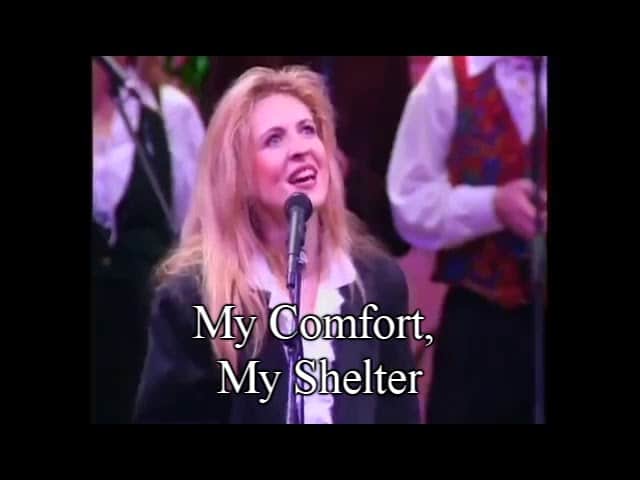
We were a Methodist megachurch-hopeful that was seeker-sensitive, and boring hymns were perceived to turn seekers off. So contemporary songs like “Shout to the Lord,” “Better Is One Day” (Matt Redman), “Open the Eyes of My Heart” (Michael W. Smith), and “The Heart of Worship” (Matt Redman) — a song ostensibly about how worship is about God and not us, even though a lot of the lines start with the word I — were added to the mix.
CCM worship music was the soundtrack to my evangelical upbringing. Of course, I didn’t know anything about how the music ended up in our church on Sundays, or that our worship leader had presumably paid to license the music through CCLI (Christian Copyright Licensing International), the leading purveyor of song-use licenses to North American churches. What mattered was how the music made us felt; it made me feel hopeful, and joyful, and closer to the Lord.
I didn’t know that “Shout to the Lord” was written by Australian singer-songwriter Darlene Zschech in 1993. Two years later, Zschech became the worship leader at Hills Christian Life Center, a Pentecostal congregation in New South Wales, Australia. The worship band, Hillsong, became so popular that the church changed its name to match it.
Your tax-deductible gift helps our journalists report the truth and hold Christian leaders and organizations accountable. Give a gift of $30 or more to The Roys Report this month, and you will receive a copy of “Baptistland: A Memoir of Abuse, Betrayal, and Transformation” by Christa Brown. To donate, click here.
Hillsong music is the primary, and profitable, way Hillsong culture imports itself to churches the world over. It’s estimated that 30 million churches still sing “Shout to the Lord” today. Hillsong is one of just four churches (along with Bethel, Elevation, and Passion City Church) today that dominate the worship charts and define the genre.
Other things were happening at Hillsong around the time our church started singing it.
Evangelistic wreckage
In 1999, Hillsong founding pastor Brian Houston learned that his father, Assemblies of God pastor Frank Houston, had sexually abused a child in the 1970s. When Brian learned of this, he barred Frank from preaching, but didn’t tell the police, the public, or the church. He knew that Frank had offered to pay his victim $10,000, and later helped to seal the deal. Brian kept quiet about the abuse up through his father’s death in 2004.
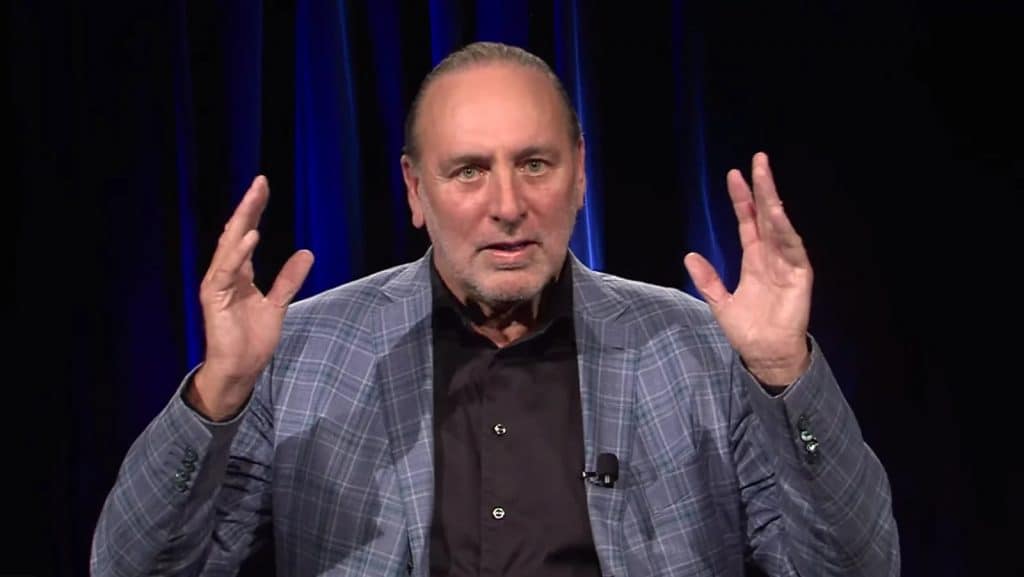
Houston is now on trial in Sydney for failing to disclose the abuse. During the trial, he surmised that his father “was a serial pedophile and we’ll probably never know the extent of it.” According to the new documentary The Secrets of Hillsong, there are 13 alleged victims and survivors of Frank Houston.
Many other bad things have tumbled out from Hillsong. Houston resigned in March 2022 after an internal investigation found evidence of inappropriate behavior toward two women. Two years prior, Hillsong NYC pastor Carl Lentz stepped down after confessing to infidelity; he was also accused by a former nanny of abuse. This year, an Australian Parliamentary leader accused Hillsong leaders of mass money laundering, tax evasion, and fraud, and exposed leaders’ lavish spending of church money.
Pastors have resigned; former Hillsong churches have shuttered or gone independent. Justin Bieber and Hailey Baldwin stopped following Lentz on Instagram, a digital excommunication of epic proportions.
And this is only what we the public know. Let us not forget the 150,000 congregants who have reportedly been a part of a Hillsong community at one time.
For people who loved Hillsong, who were active and devoted members, who trusted its leaders, who sacrificed their time and talents in service of its mission, there must be such deep grief, a sense of betrayal, and cognitive dissonance. How could this church that blessed me also harm so many people? How could a tree that looked healthy bear so much bad fruit?
At some point, Hillsong became a business and not a church — a business more interested in global expansion and protecting its brand than ministering to all people in its midst. It hurt unknown numbers of people in the process. Hillsong’s evangelistic wreckage is vast.

So that our churches don’t pile on to the scandal and offense and create further barriers for people experiencing the love and trustworthiness and radical humility of Jesus, it’s time to stop singing Hillsong music in our churches.
Follow the Money
The question “can you separate the art from the artist?” is both perennial and newly charged, in light of our broader cultural reckoning over abuse. Basically, can we still enjoy the good art of terrible people? Can I still listen to Michael Jackson songs on Spotify? Must I self-flagellate while watching Hannah and Her Sisters, one of my truly favorite movies made by a Hollywood director credibly accused of awful things? etc.
I have no polling to back this up, but my hunch is that Christians are prone to say “yes” — we can still honor the good work of someone who did otherwise sinful, criminal, and heinous things. That is because Christians are people of forgiveness, who believe that people are more than the worst things they’ve done, and that God can still use broken people and systems to do otherwise beautiful work in the world.
King David was a rapist and murderer, and we read aloud his songs of praise in church every Sunday! Besides, we are all worthy of God’s judgement, and still God works through fallen human beings. God is the author of all praise music, anyway.
My argument for why we should stop singing Hillsong music in church is two-pronged. The first prong is about money, and the second is about being above reproach to a watching world.
#1 Money
If your church licenses Hillsong music for worship, you are one branch of the Hillsong tree, regardless of whether your average churchgoer knows it. In my view, that tree is now so diseased and unhealthy that it must be felled. That means the music must go with it.
To drop the agricultural image and get straight to the money: Every time your church licenses a Hillsong song for use in corporate worship, the Hillsong enterprise receives payment. On the individual church level, it’s not a lot. But if 30 million churches are still singing “Shout to the Lord” every week, that adds up to a pretty penny. According to The Fader, a 2017 independently audited annual report found that Hillsong made $14 million that year directly from music — that is tax-free. Span that out to two decades, and that’s hundreds of millions going to support the Hillsong enterprise.
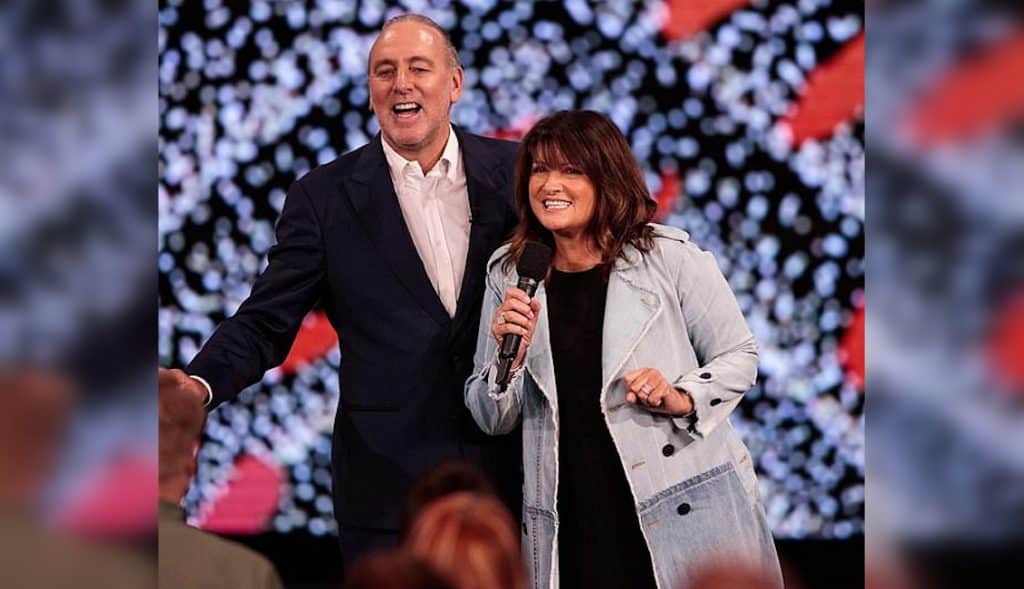
We could also talk about royalties the church receives any time you play a Hillsong song on Spotify, or the money that flows back to the church any time you attend a Hillsong United concert. But let’s narrow this down to corporate worship. What I didn’t realize as a teenager singing “Shout to the Lord” is that Contemporary Christian Music is a business. Businesses aren’t by their nature evil, and artists should be paid for their creative work (although it sounds like not all Hillsong performers and musicians are compensated for their work).
But when you license Hillsong music, you are helping to support a business that is now revealed to be spiritually and morally sick. King David doesn’t get any royalties when see read Psalm 23 together at church. We now know too much to act as if all that matters in singing Hillsong music together is how it makes us feel.
#2 Church Witness
A new Barna survey found that Americans have a very low view of “famous or well-known worship bands,” “famous people or celebrities who are Christian,” “celebrity pastors,” and “megachurches.” It’s ironic that so many churches have used celebrity to attract people to the church, only to have celebrity be the very thing that repels many people from it.
Yes, stories of religious people being hypocrites feed salacious headlines and collective schadenfreude. Hello, Jim Bakker! The world loves to see people who preach one thing — especially in matters of sex — be revealed to be doing other things behind closed doors. Hello, Ted Haggard.
But Christians would be foolish to write off all outside criticism of the church as persecution, or accept it as a sign of God’s blessing. Perception matters. Reputation matters. In his list of qualifications for pastors in 1 Timothy 3, Paul says pastors are to have “a good reputation among outsiders” (v. 7).
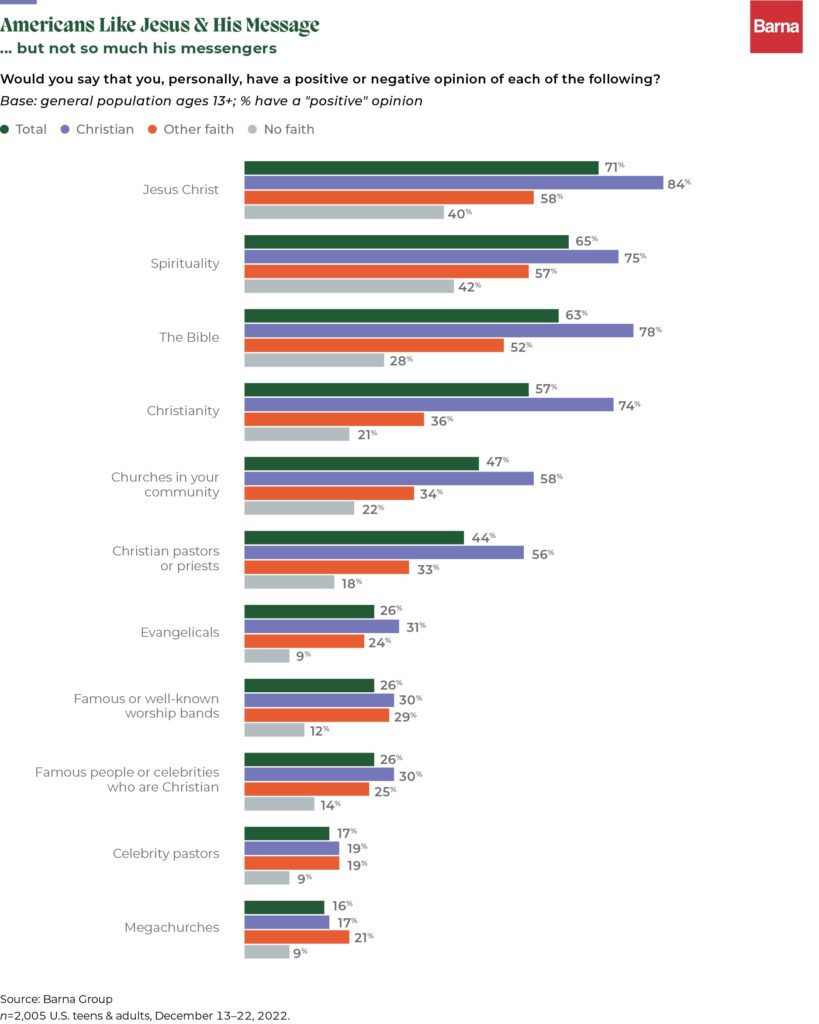
There are now several documentary exposes about Hillsong, plus hundreds of news headlines, podcasts, and social media accounts detailing its collapse. What was hidden for so long is now being revealed. The cat’s out of the bag. That’s a good thing.
But now, the Hillsong name is so sullied by scandal in the public square that we should assume that our neighbors have heard something about it, and have a generally negative impression of it, even if they don’t have all the facts or haven’t followed the story closely.
Why would churches associate with the Hillsong name — if only in a song credit at the end of a Powerpoint — if their unchurched neighbors could get the wrong impression? Why risk unnecessary scandal when there are so many other worthy songs to choose from?
Corporate worship is a set-apart time. When we sing praise together, we are participating in a hallowed activity. It’s not just about how we feel when we sing particular songs, although our emotions are usually engaged when we worship. Music is powerful, and as such ought to be handled in church with care and reverence.
The Hillsong name — if not all the people who have ever been a part of it — is clearly damaged, and I believe irreparably so. Let’s use our worship time together to communicate in word and deed to others that the church is a place that loves truth, that protects vulnerable people, that uses resources rightly, and that seeks integrity in its leaders. It seems to me that dropping the Hillsong connection would be a place to start.
This article has been republished from The Beaty Beat.
 Katelyn Beaty is author of Celebrities for Jesus: How Personas, Platforms, and Profits Are Hurting the Church (2022) as well as editorial director of Brazos Press. An Ohio native, she lives in Brooklyn, NY. Learn more at KatelynBeaty.com.
Katelyn Beaty is author of Celebrities for Jesus: How Personas, Platforms, and Profits Are Hurting the Church (2022) as well as editorial director of Brazos Press. An Ohio native, she lives in Brooklyn, NY. Learn more at KatelynBeaty.com.
Editor’s note: Click below to hear a lively podcast discussion on whether or not churches should still sing Hillsong worship choruses.





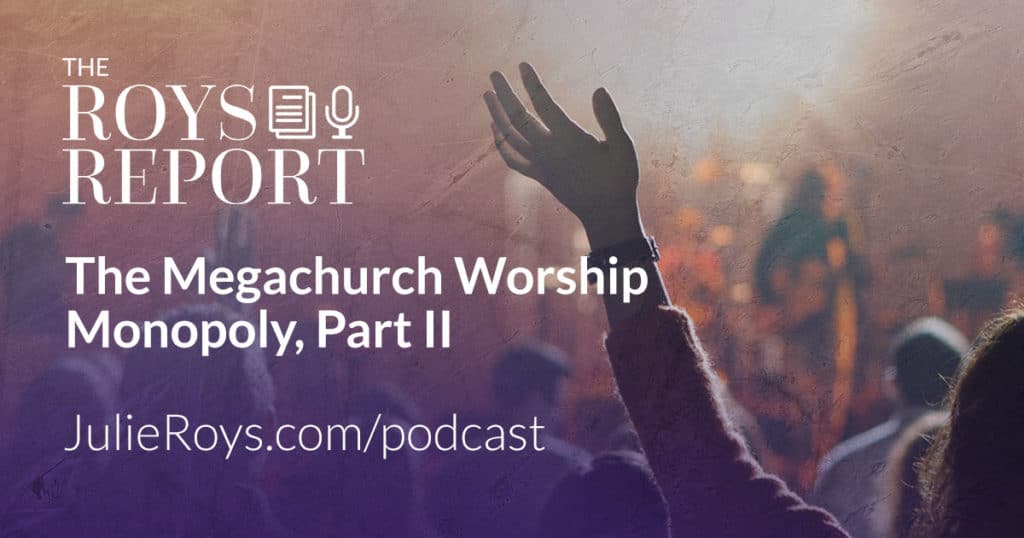



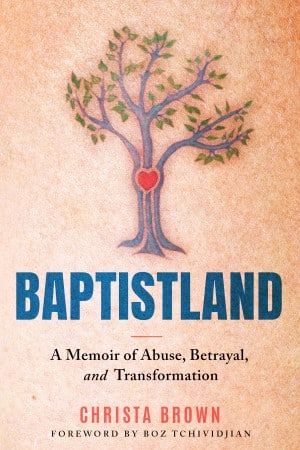
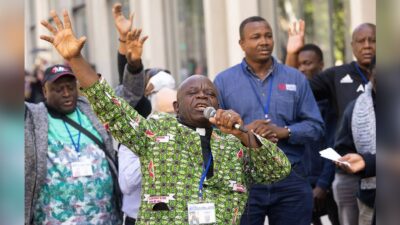
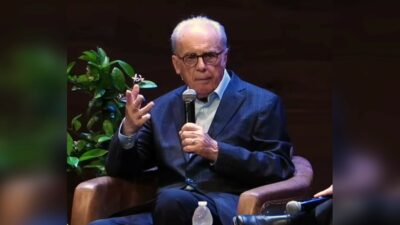


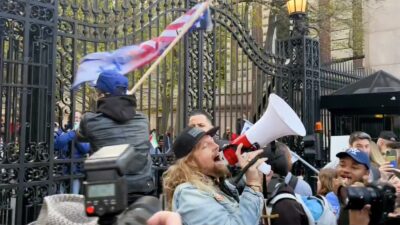







44 Responses
The systemic problem is Christian music should be public domain like the old hymns…
Were “the old hymns” public domain when they weren’t the old hymns, though? It seems to me that it’s the “evangelical industrial complex” that’s the problem, not paying people for their work per se. Spitballing here, but what if it was normal for churches to directly support independent musicians? If you could forget paying licensing fees, and go subscribe to some Christian songwriters’ Patreons or something instead?
From what I understand, the mechanical royalties to the songwriter(s) go to them (the smaller end of the scale) and the performance royalties (bigger royalties) go to the listed performers. If it says, of example, Hillsong Music, then the performance royalty goes to the church. If it lists the singer and players or band, they get the performance royalties. The solution? List the signers and players (performers) and let them get the bulk of the royalties.
I don’t think that would be fair to the artists who work so hard to write and produce the music. Should a Christian accountant do taxes for free? Why do Christians believe those in creative ministry shouldn’t earn a living from their life’s work? This mindset goes against Scripture (1 Corinthians 9:14)
Lots of people write worship songs and most of those songs are not sung very widely – maybe just in their own church. Many of those are just as good as those which become popular. It’s mostly those in the big publishing houses with marketing machines.
The creators of hit songs didn’t necessarily do any more work than the ordinary writers. Why do they deserve huge royalties while the other writers get little or none? That’s why the analogy with accountants doesn’t work.
@bev,
I’ve always been a fan of creative Commons. It allows artists and content creators to restrict certain uses (say for profit performances by other artists) while specifying others (use in a worship service for example). It isn’t public domain but it does allow them to retain some control over their works until the works do eventually enter the public domain.
Excellent article making good points. Let’s restructure worship music to be true worship only to God.
Interesting. Many Latin American Christian performers put the chords to their songs on YouTube, along with the videos, and invite church musicians to use them. If we do a song by Athenas or Hermana Martha Isabel, nobody is paying or receiving any money.
Hillsong is flawed, yes.
So is Chris Tomlin, Matt Redman, Larry Norman, Keith Green, Amy Grant, etc.
If we cancel culture all of them, where does it end?
What happens when we are the ones who need the grace?
The “moral majority” of the 80s taught their children how cancel culture worked. It was passed on to their children and grandchildren.
We did this. Let’s undo it.
I’ll end with a hymn:
They will know we are Christians by our love.
Not our hate.
Dear Excuse-makers,
When I was a child, I was repeatedly raped by a relative. Among other things, this experience left me wary of music from nasty corporations with hidden motives and no sexual boundaries. But when I made the argument against the “tunes” of Frank Houston and his cohort, I was told by a board member of my church “don’t let the door hit you on the way out”. After 24 years.
Mr. Goode, Mr. Warner, since you have so much discernment and wisdom perhaps you could pause in your forgiveness crusade and forgive this broken old man for not wanting to be revictimized by millionaires. Could you do that for me?
That is what is missing in our religious celebrity worship church culture. Love and forgiveness are offered to those who keep the institutions or “church” corporations operating for the “gospel” sake. But so many in the church culture will dance around the abuse and not spend time with those who were abused and traumatized. Empathy and compassion for the truly hurt ones is lost. Hillsong just happens to be exposed. The system is broken, and many cannot see it from the inside. Abuse will continue, be covered up, and the system will be defended. Churches are not safe places. I know many wince at that statement. The wolves continue to control and deceive. And it takes years before the abuse comes to light. Too many lives are tormented over time. Change is needed if there is to be any hope for current and future victims.
Such a great point! If you look at the life of Luther or others who wrote the hymns, their lives weren’t spotless either. God uses very flawed people… in the Bible and now. Just because someone behind a song is not living right doesn’t mean it can’t impact people for Christ in a good way.
Flawed is one thing but blameless is what we are called to be. The closer to God one gets, the deeper the reflection they see of who God really is (Hebrews 11:6).
John Wesley said what one generation tolerates, the next generation gladly accepts. What this implies is once compromise is tolerated, the next generation will roll with it like it never happened.
I see so many churches tolerating music that sounds scriptural but it gives us the “good feeling” than strictly toward God in reverence. It is more about our feelings about God than sitting in awe of His presence. Performance triumphs over admiring the beauty of His holiness.
Get people to sit and tell them to worship without a band and everyone would be lost.
I can accept flawed spiritual leaders- especially ones that confess and make amends. Hillsong leaders are not “flawed”, they are corrupt, and unrepentant. It’s not hate to stop participating in harmful systems. I don’t think the music being good is justification for participating in hillsongs corruption.
I still sing the old familiar hymns but I find it a bit over the top to lump all those millions blessed with their contemporary songs in the same category and say STOP SINGING! The writer of “IT IS WELL WITH MY SOUL” became a heretic but we sing the song.
It rumored that Isaac Watts later became Unitarian and of course
“Faith of our Fathers” was written by an English Catholic urging
faithfulness to the church of Rome. I certainly agree ministers have feet of clay. God has not spared any of the Bible characters from their glaring sins. If a song is theologically correct I think it might still be a blessing.
Bless you. Keep singing the hymns… Sandy Patti, Mike English, soooo many…it shows me that the one thing Christians
can’t handle well is SUCCESS!
Im sorry but this has become some kind of original sin mentality. To say all these songs are tainted and unholy because of the deeds of one man who did not write or perform them but merely facilitated the ministry of the people who did is legalism and superstition.
I think we need to apply the principle of meat offered to idols. If we can give thanks for a roast even though it was blessed by pagan priests, we can disassociate beautiful worship music inspired by God from the leadership of a single corrupt non contributor to the creative process.
By this standard we should rip every Psalm of David from the bible because of his murderous cover up of adultery.
Nope. We still make worship songs out of his music. As such Darlene and Co. are neither David or Bathsheba in this scenario and as such deserve to be cancelled no more than Solomon or The Sons of Korah.
Stop with the guilt by assocition.
It is not accurate to say that when Frank Houston’s offense came to light Brian kept it from people. He did not report to police and that is an issue for the courts to settle. Brian was the head of the AoG in Oz and he took his father’s credential away (which is publicly announced) and made sure he was not allowed to speak in any AoG (renamed in Oz to ACC) for the rest of his life. Thousands of people knew what it was about. It was not a secret. Brian’s mistake was hubris, to try and prove he could handle the case of his own father. Had he recused himself and the case handled the same, I doubt whoever would have done it would be facing court. A son handling his own father’s discipline will always be questioned.
Two things come to mind while digesting this article and the comments so far.
1. Creatives and their investors have the right under copyright law to make money from their creative work. It is both naive and immoral to suggest otherwise, as some commenters here seem to. If a local church is using copyrighted material, they shouldn’t complain about paying up through the established channels, especially if using someone else’s work helps that church measurably reduce or re-allocate their own staffing costs.
2. It’s also a free market. Here’s how. Christians have been writing poetry and song lyrics and composing music for millennia, and the vast majority of this material is in the public domain. Also, old music and texts can be rearranged to fit contemporary aesthetic sensibilities and instrumentation. (Who knows? You might want to copyright a new arrangement.) If money’s an issue, or you don’t want to support a specific organization or artist, or you just find the whole CCLI scheme icky, then by all means go a different direction. There’s a whole universe of alternatives out there, and there’s probably a good chunk of long-neglected material that fits your church’s stated theology better than what’s on offer from today’s popular industrial sources.
So Shout to the Lord predates Hillsong. I thought it sounded different.
Hillsongs was the name for the church’s music ministry for some years before the church was named Hillsong. The annual Hillsong conference may also predate the church name.
Other large Australian churches (Planetshakers, Influencers) were the name of a conference before the churches took that name.
This was a very thoughtful and well written article and I appreciate the kindred spirit with which it was written. It was timely because just this week I was thinking if we as Christians should hold the sins of an organization (i.e. Hillsong) against the artist.
I am reminded of the words of John Wimber years ago, who was instrumental in Vinyard music when he said “when money gets involved, the oil flow stops”.
Church is a business. Big churches are big business. But Jesus Christ is still Lord. Thank you for a great and thoughtful article.
In general I agree with the idea that what you spend your money on you endorse. I have been vocally avoiding certain things for decades.
I don’t personally intend to die on the Elevation, Bethel, Hillsong, hill, for several reasons.
First, as many have stated, flawed people are used by God, and for God’s glory. Much of the music is moving and scripturally sound. They’re part of the soundtrack of my faith.
Second, no one in the larger secular world even knows what is Hillsong and what isn’t. At best it will appear as a sort of virtue signaling to a very small segment of the Christian world, many of whom also don’t know what is Hillsong music and what isn’t.
For the record, I pastor congregations who sing almost exclusively hymn music.
I certainly concur that worship music should not be copyrighted, and controlled, and sold for a profit. But what we need to realize here is that we are dealing with, not a biblical church, but a 501c3 non profit CORPORATION. In fact, that is what a vast majority of what we call churches really are. Tax dodging corporations. Profit centers. The one thing that makes any worship music special is the ANOINTING of the Holy Spirit. Without it, we are just a bunch of noise. The same goes for preaching and teaching. The songs we are familiar with in discussion here were indeed anointed when first written, but God has removed his Spirit from Hillsong because, like so many, that church used the giftings of God for fleshly gain. I see it all over the modern day “Christian” churches. Paul Washer is another example and of course we can’t leave out John MacArthur, who epitomizes the very essence of a heretic & hypocrite, and a wolf in sheep’s clothing. Thank God for raising up the Roy’s Report, for until I found this I was getting to feel like the lone ranger in my discernment of these wolves.
Just watched the 4 part doc on Hillsong. I wasn’t aware so many current contemporary worship songs generating royalties for them and other groups. It’s no wonder we hear more “Shout to the Lord” as opposed to “A Mighty Fortress is our God”. Both are beautiful songs of worship. The latter can’t make money for the current group. I’m increasingly skeptical of the mega church. Lotta tombstones of fallen preachers.
It just saddens me that Christians need to find ways to make an excessive amount of money and using God’s name to do so. So many of the old preachers kept only what they needed and gave the rest to orphanages, missions, and those in need.
As far as today’s CCW, it has fallen so fast from worship and risen toward performance. We sing more about how we feel about our worship than to God Himself. It is done to give us goosebumps anf adrenaline than truly understanding to worship in the beauty of holiness. Only if we truly knew of His majestyand glory would our lyrics and music be different today.
Others have said some of this, but let me make the case a bit more fully:
What if some churches decided not use songs requiring royalties? Only using those in public domain or where writers had agreed to allow free use by churches. What if this became the normal way for churches to operate? What would we gain or lose?
There are lots of ordinary Christians who have written songs that have never been sung widely. Maybe only in their church. Some of these songs are just as good as the popular ones.
The fact that most of the most-played newer songs come from a smaller number of publishers suggests that songs rise to prominence not simply for being good but also because they were promoted by a superior marketing machine.
One might argue that creators deserve to get paid. Well most creators don’t get paid. Do we really that the elites ought to earn loads in royalties while creators of similar works that took just as much work get little or nothing?
The result might be the mostly the same, except…
1. Ordinary churches are saved a small fee
2. Less money funnelling into the coffers of the big houses (a bit of which flows to wealthy individuals, and though much may flow back into good ministry, I’d rather see ordinary churches using that money)
3. We might hear from a slightly larger range of writers
4. A small reduction in celebrity culture
5. A small reduction in opportunity for business interests to make a buck off the Church
Many of the popular songwriters would happily write songs. I love songs by big names like Kendrick, Morgan, Townend/Getty etc but would be happy with any of the good ones that don’t become famous the way things are now.
I don’t think this is particularly fair on Hillsong.
By looking at the state of “churches” these days (as regularly reported in the Roys Report), there are probably few people in the world who attend a building that has never had even a whiff of a scandal or false teaching.
Does that mean if attendees themselves are living holy lives, we shouldn’t listen to anything they say or anything they put to music???
Hillsong has had dozens of songwriters in the last 40 years or so (and several different styles and genres of music) and all of them seem to have been living blameless lives.
In fact, the main Hillsong songwriters and performers today (Joel Houston, Taya Gaukrodger, Brooke Ligertwood, Matt Crocker, Hannah Hobbs, Ben Fielding, Benjamin Hastings, Michael G Chislett, Dylan Thomas, Jad Gillies, Ruben Morgan, JD Douglass and others) are married to their covenant spouses i.e NO DIVORCES.
Hillsong (music, not the church) attracts a lot of opposition spiritually-speaking because they sing about VICTORY in Christ, OVERCOMING and have written more than a couple of songs based around Romans 6 (a chapter that is scandalously ignored in the predominantly Calvinist Christendom of today).
“Dozens of songwriters…and all of them SEEM to have been living blameless lives”? Give me arguments I can believe! Frank Houston was married to his ” covenant wife” and it didn’t stop him from abusing near countless little children. Victory doesn’t count when its against the innocent.
In reply to C Hanley: Frank Houston, father of Brian Houston, was dismissed in 1999.
That was long before the songwriters and musicians I mentioned above began contributing in earnest (or some of them even JOINING Hillsong!
For example, lead vocalist Taya was ten years old in 1999).
There are professing Christian artists who attend much more questionable churches (in terms of doctrine) than Hillsong and they have lyrics – eg. those of Lauren Daigle – which barely mention God.
But as a Christian, I would never shame someone for listening to them/her.
“Cancelling” is simply not Christian and neither is a refusal to show grace to young songwriters who lead blameless lives and seek only to praise Jesus. Look at the testimonies in YouTube comments sections of Hillsong’s videos as proof of the good fruit.
To be consistent, people like Katelyn would be obliged to “cancel” Fanny Crosby if it came to light there was some scandal in the (MANY) churches she attended during her lifetime.
That’s truly where we would reach the realms of absurdity and self-sabotage!
Thank you Ms. Heuston for insinuating that I’m not a Christian, an “absurd” one at that, because I objected to open sin and corruption. You must be fun at potlucks. What happened to TRR’s TOS?
There is too much good music out there nowadays to have to reach to Hillsong, Bethel, Elevation, etc. These songs are as theologically weak as the Biblical knowledge of the average Christian out there, and it’s repetitive to the point of programming where the brain is disengaged entirely. (In line with the experiential and anecdotal style of teaching/conducting church these days. The audience style church of the Greek theater developed in early American history is coming to roost…) what happened to loving God with your whole being, including your mind? I have noticed how many of those who choose to use these songs have often given no consideration to those who’d like to sing something else (nostalgia, good feels, etc?), perhaps because it’s self-centered to the point that there is no faith in God being built – it is faith in your own faith which will fail eventually, given the right triggers. And I could go on. It makes all my discernment flags go up. If someone decides to sing one of these songs, I cannot sing it. It’s cult like. And I grew up with many of these songs. Even if you don’t call for a corporate boycott, you can choose for yourself based on your own convictions.
i’m blown away that the author fails to discuss the best reason to not sing hillsong music: bad theology. certainly the theology that we teach and sing back to god is of utmost importance. hillsong music has been bad theologically from day one and no actual christian church should be using it.
Examples of bad theology, please. You can’t just make a blanket statement about theology in songs; you must be specific
Exactly Louis Zaragoza!
These too-often-seen blanket accusations with no specific examples are a red flag to me because they are not Christ-like: in fact, quite the opposite considering Christ actually endured the same!
There is way too much jumping on the bandwagon as far as Hillsong (as well as Bethel and Elevation Worship) is concerned.
Folks need to remember “the Golden Rule” i.e Christianity 101.
The right thing to do before criticizing anyone or anything is to do one’s own diligent research and not take as gospel someone else’s claims.
(eg. the long list of heresy hunters on YouTube who get many more views and hence earn MUCH more cash when they condemn – no matter how unfairly – the “big three”).
well i think it’s obvious — just read the lyrics. but here is a good article that lays it all out.
https://g3min.org/stop-singing-hillsong-bethel-jesus-culture-and-elevation/
That article lays nothing out. It is a critique of emotion filled Pentecostal worship viewed from a cessassionist point of view that is unbiblical in my estimation. I love emotion in worship. I love crying during worship. I love to feel the Glory of God during worship. After all, He is my God, my Savior, my Redeemer. Wow, if I cannot get emotional about that, what is left to be emotional about? Many times we are afraid to be emotional in the Presence of God as if He is embarrassed by our display of fervor and love. I think He loves it when I’m emotional and cannot express in English my desire for Him and my longing for His Glory, virtue, and holiness.
Please fact check the figure of 30 million CHURCHES singing Hillsong Music. 30M people, maybe ?
I doubt there are 30M churches in the entire world. Consider that most estimates of the number of Christians worldwide are around 1 billion; spread across 30M churches is only 33 people per church, on average. Not enough to support a paid pastor or even a building in the developed world, let alone pay for music.
Thank you.
Sorry, that 1 Billion figure is for Evangelical Catholic, Protestant, and Pentecostal/Charismatics. A 2nd billion comprise liturgical Catholic and Orthodox.
the biggest argument is that they just aren’t that good. Ok, they are fine (enough, I guess) for listening in the car in the kitchen if that’s your thing, but they are 100% not written for true corporate worship. There are no distinct 4 part harmonies in any of it. It’s pop group music, so unless you are a high male tenor in Bono or Chris Martin vocal range you’re out of luck on the male side, if you’re a female you’re equally hosed. Not to mention, because it’s all in powerpoint and not written for voices, only a fraction of people with decent musical ears will be able to pick out their own harmony.
It’s just bad music for collective singing. That should frankly have been enough at the out.
As a point of Biblical exegetical clarity, it would be accurate to say that David took unseemly advantage of Bathsheba. There is no evidence in 2 Samuel 11, however, that King David raped Bathsheba. The offense is placed entirely on David. He paid for that grievous adulterous act throughout the remainder of his life. But the Biblical text does not support the contention that David raped Bathsheba.
This seems a lot like “throwing the baby out with the bathwater” or the “cancel culture” conservatives claim to be against (I know Target, Keurig, Nike, the Dixie Chicks and others can disprove this, but I digress…).
Now, I do wish we did more singing of hymns in today’s church. My pastor can WEAR US OUT with sermons on hymns, and how Biblically sound they are. It saddens me to see so many young Christians unfamiliar with classics like “Blessed Assurance”, that have lifted not only my spirit, but those of my great grandparents and many before me. Same with spirituals.
But many are undoubtedly touched and/or introduced to who our God is through contemporary songs like those written and popularized by Hillsong. I don’t believe we should take that away from them. I mean, scripture is full of examples of flawed prophets who were still doing the Lord’s work. David wrote some of my favorite Psalms while knee deep in his own sin, too.
Good conversation and comments to ponder. For many years I owned and operated a marketing firm. At some point, “evangelical” type accounts found our staff and approach a good fit and we did a great deal of work within the “Christian Booksellers” space. We promoted films, wrote marketing plans for book launches, created displays. Guess it felt good to not be working with those nasty “worldly” accounts. But one day, I walked onto a convention floor at a Christian Booksellers Convention. What I saw there, what in some way, I had participated in creating, made me nauseous. As far as you could see was trinkets with out of context Bible verses, bumperstickers, a Bible for every imaginable sub group, “hot” Christian groups singing their “new single” and people line up for a block hoping to get their photo taken with the latest new author. I had been to these events before, but that day, it hit me in a new way – I could no longer participate in the “Evangelical Industrial Complex.” It’s a world most will not see, There’s a fine line between critical thinking and cynicism that we each must navigate. The simple, unadorned truths of Scripture without the “benefit” of a dark sanctuary and frenetic light show works for this now, old man.
Yea I’m going to say is it ok to call about sin that hurts others? In a graceful way, in a non condemning way of course. Love covers sin, it doesn’t cover it up.
That said he who is without sin cast the first stone. So all people who write songs may have questionable life decisions at some point. What sin constitutes cancellation? See the slippery slope?
If it uplifts Jesus sing it. Easy fix.
The one thing that I did not see outlined in this article, nor did I read in the responses, is the fact that Hillsong teaches prosperity Gospel. Royalties from their music go to fund their false teachings. That is a HUGE issue!